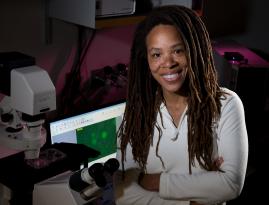
Prof. Ronke Olabisi is an Assistant Professor and Samueli Development Chair in Biomedical Engineering at UC Irvine. Dr. Olabisi’s research interests encompass biomechanics, biomaterials, tissue engineering, and regenerative medicine to repair or generate tissues. Specifically, her approach is through developing biosynthetic materials, which combine the best aspects of synthetic and biological materials and can control cell and tissue function. She has developed wound dressings that accelerate the healing of chronic diabetic wounds faster than normoglycemic wounds and combination seashell-synthetic biomaterials capable of directing osteogenesis in microscopic patterns. In the 5 years since her effective start, Prof. Olabisi has graduated 4 PhDs, 7 Masters, and trained 47 undergraduate researchers. She has published 2 book chapters and 29 articles in peer-reviewed publications (one cover article). Her students have delivered 81 presentations in 44 scientific conferences and she has given 22 invited talks. Prof. Olabisi received the Frontiers in Bioengineering Best Poster Award (2014), the Charles and Johanna Busch Memorial Grant (2014), an Engineering Information Foundation Award (2016), the National Science Foundation CAREER Award (2018), the Rutgers’ TechAdvance Commercializing Innovative Technologies Award (2018), the Johnson & Johnson Women in STEM2D Scholars Award (2019) and the Biomedical Engineering Society’s Young Innovators in Cellular and Molecular Bioengineering (2019). Prof. Olabisi’s work was selected for the NSF Innovation Corps and the IP department is patenting her research on the symbiotic relationship between coencapsulated cells, which has laid the groundwork for improving the outcomes of cell-based therapies, which have yet to achieve their potential.
In addition to her research efforts, Prof. Olabisi developed 2 programs to increase gender diversity at her institution. With tissue engineering course-based undergraduate research experiences (CUREs), she targets early-stage female engineers in a supportive all-female community, which research shows improves female students’ persistence in STEM, and teaches them self advocacy. Female sophomores without research experience are invited, circumventing student apprehension about requesting research opportunities. All students present their research at a scientific conference. She has also run a department-wide 2-year undergraduate research program since becoming faculty. Her 65+ undergraduate researchers have come from diverse socioeconomic backgrounds, include 58% women, 40% underrepresented minorities, and 8 of her 11 graduate students have been women. She recruits from classes and existing programs like NSF’s REU or research programs she runs. Additionally, she addressed the dearth of women faculty in the College of Engineering (18%). Knowing only 10% of faculty applicants were women, she started an annual workshop, Writing a Killer Faculty Application, which provides guidance on compiling a faculty application packet. The workshop is free to women and underrepresented minority postdocs in exchange for their permanent email so the department can compile a growing database of diverse applicants for future faculty searches. She appeared on Mission Unstoppable, a television show designed to increase young girls’ interest in STEM. Finally, she served on the National Academies of Sciences, Engineering, and Medicine’s study session: Promising Practices for Addressing the Underrepresentation of Women in STEM: A Comparative Analysis across Scientific and Engineering Disciplines.
